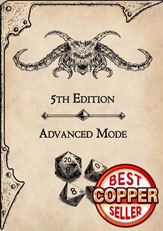Medium humanoid, neutral
Armor Class 11
Hit Points 11 (2d8 + 2)
Speed 10 ft., swim 40 ft.
Proficiency Bonus +2
Proficiency Bonus +2 (5th Edition Advanced Mode)
| STR | DEX | CON | INT | WIS | CHA |
|---|---|---|---|---|---|
| 10 (+0) | 13 (+1) | 12 (+1) | 11 (+0) | 11 (+0) | 12 (+1) |
Skills Perception +2
Senses passive Perception 12
Languages Aquan, Common
Challenge 1/8 (25 XP)
Amphibious. The merfolk can breathe air and water.
ACTIONS
- Spear. Melee or Ranged Weapon Attack: +2 to hit, reach 5 ft. or range 20/60 ft., one target. Hit: 3 (1d6) piercing damage, or 4 (1d8) piercing damage if used with two hands to make a melee attack.
5th Edition Advanced Mode
Limiting the power of a character and making the overall difficulty of the game harder, does not reduce the creativity, indeed it does quite the opposite.
The Game Master has the option to use any and all of the instances proposed in this guide, or just some of them according to their preference.
It is the lack of something that move and motivate characters, not the abundance of it
DESCRIPTION
Merfolk are aquatic humanoids with the upper body, arms, and head of a human and the lower body of a fish. They have gills on their necks, webbed fingers, and eyes that range from ice blue to pale silver. Their skin, hair, and scales can vary in color, depending on their environment and ancestry. Some merfolk have tattoos or adornments made of shells and coral. Merfolk are playful and curious creatures, but they can also be mischievous and pranksters. They are generally neutral in alignment, but some may lean towards good or evil depending on their culture and circumstances.
Merfolk were once human but were transformed by unknown powers into their current forms. They live by herding fish, but during times of need they attack other sea-peoples or ocean-going vessels. They live underwater but surface to sun themselves on large rocks.
COMBAT
Merfolk are not very adept at fighting on land, as they have a slow speed and a fish-like tail that hinders their movement. They prefer to avoid combat with land-dwellers, unless they are threatened or provoked. In water, however, they are swift and agile, using their natural swimming ability and their spears to fend off enemies. Some merfolk may also have access to magic, such as druidic or clerical spells, that can aid them in combat or defense. Merfolk are loyal to their tribe and will fight to protect their home and kin.
HABITAT / SOCIETY
Merfolk live in small tribes beneath the waves, usually in warm or temperate climates. They dwell in coral reefs, underwater caves, sunken ruins, or other places that offer shelter and resources. They have a simple and communal lifestyle, sharing food, goods, and tasks among themselves. They are friendly and cooperative with other aquatic races, such as dolphins, sea elves, or tritons, but they are wary of strangers and invaders. Merfolk have their own language, called Merfolk, which is a dialect of Aquan. They also speak Common and may learn other languages from their contacts with other cultures.
Merfolk society is heavily patriarchal. They prefer to be left to themselves and usually reject proposals of friendship or trade. They have strong territorial instincts and they do not love surface dwelling humanoids. Males hunt and herd fish and protect their territory. Females raise children and tend to domestic affairs. Female merfolks are also known for their creativity, and they produce works of art for the community (shell carvings, seaweed tapestries, and songs).
ECOLOGY
Merfolk are omnivorous creatures, eating fish, seaweed, shellfish, and other marine delicacies. They also trade with other races for goods that they cannot produce themselves, such as metal, cloth, or spices. Merfolk have a natural affinity with the sea and its creatures, and they respect the balance of nature. They worship Eadro, the god of the sea and merfolk, who grants them his blessings and protection. Merfolk are also known for their artistic talents, such as singing, dancing, carving, or weaving. They enjoy music and stories, especially those that celebrate their history and culture.
Merfolk can survive out of water for one hour before they begin to dehydrate. When dehydrated, they lose 2 hit points per hour and will die when they reach zero; immersion in fresh or salt water immediately restores these lost hit points.
Merfolk have an average life expectancy of 150 years.
Merfolk have many natural enemies but particularly hate the sahuagins (or Mermen) from D&D. Have a look at various sources and ixitxachitl. They often clash with tritons over territory.
POTENTIAL ALLIES OF THE MERFOLK
Merfolk are not alone in the vast and diverse ocean. They have many friends and allies among the other aquatic races, who share their interests, values, or goals. These allies can offer merfolk various benefits, such as trade, information, protection, or companionship. Here are some of the sea creatures that can be potential allies of the merfolk:
- Dolphins: These intelligent and friendly mammals are often seen swimming with merfolk and helping them in various tasks. Dolphins can communicate with merfolk using a common language and share a bond of friendship and respect. Dolphins can also assist merfolk in combat, using their speed and echolocation to scout and attack enemies.
- Sea Elves: These aquatic elves are cousins of the merfolk and share many traits and values with them. Sea elves live in underwater cities or nomadic tribes, and have a culture that values art, magic, and harmony with nature. Sea elves can cooperate with merfolk in trade, diplomacy, and defense, as well as share their knowledge and skills.
- Tritons: These proud and noble humanoids have the upper body of a human and the lower body of a fish, similar to merfolk. Tritons are guardians of the sea, protecting it from evil forces and maintaining order among the aquatic races. Tritons can ally with merfolk in times of need, offering their martial prowess and leadership.
- Selkies: These shapeshifters can transform between a seal and a humanoid form. Selkies are nomadic, traveling in pods with their seal kin. Selkies are curious and playful, often interacting with merfolk and other races. Selkies can provide merfolk with information, entertainment, and companionship.

